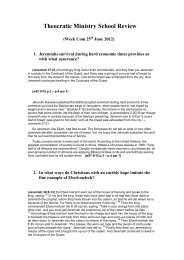1964 Awake! - Theocratic Collector.com
1964 Awake! - Theocratic Collector.com
1964 Awake! - Theocratic Collector.com
Create successful ePaper yourself
Turn your PDF publications into a flip-book with our unique Google optimized e-Paper software.
medical treatment he will accept? Does he<br />
have the right to decide what will be done<br />
to his body?<br />
Medical Science<br />
Many of those in the medical profession<br />
are sincerely interested in helping the sick,<br />
in alleviating suffering, and in saving life.<br />
Beyond a doubt, they have done much good<br />
for humanity.<br />
At the same time, honest doctors will<br />
freely admit that medicine is not an exact<br />
science. There are few, if any, absQlutes,<br />
due to the <strong>com</strong>plexities of the human body<br />
and mind. There is disagreement among<br />
those of the medical profession on forms of<br />
treatment. How best to treat diabetes,<br />
whether to add fluorides to drinking water,<br />
use of hypnosis by psychiatrists, and radical<br />
sw-gery as routine practice in cancer<br />
cases, are but a few of the many areas<br />
where currently there are strong differences<br />
of opinion in medical circles. Yes,<br />
honest doctors acknowledge that what they<br />
offer is their best opinion and not the perfect<br />
answer.<br />
Also, because of human imperfection,<br />
there is always the possibility of error in<br />
diagnosis due to lack of knowledge, poor<br />
training, lack of experience, carelessness,<br />
or for some other reason, as the proliferation<br />
of malpractice suits bears testimony.<br />
Consider carefully the words of Dr. A. A.<br />
Klass, of Winnipeg, Canada. Writing in the<br />
Canadian Bar Journal (1960, 3, 222-224)<br />
on "Why Do People Sue Their Doctors?"<br />
he stated: "First and foremost is the very<br />
nature of medical practice itself. In a field<br />
of rapid discovery, the accepted treatment<br />
of today was risky yesterday; and will be<br />
obsolete tomorrow. During the period of<br />
yesterday, the treatment was new and<br />
hazardous, perhaps experimental in the<br />
eyes of the court, and few doctors would<br />
<strong>com</strong>e to its defense. During the period of<br />
tomorrow it is obsolete, antiquated, proven<br />
22<br />
to be wrong, condemned in the witness bo1'<br />
and accepted as negligent by the court. It<br />
is only during the brief period of today<br />
that the treatment is right and proper and<br />
this period is made ever shorter by the<br />
rate of discovery."<br />
Dr. J. H. Dible, Professor of Pathology.<br />
writes in the Postgraduate Journal, Volume<br />
29, page 59: "Medical progress is a<br />
study of trial and error, of false paths, of<br />
whole generations under the sway of<br />
wrong ideas leading to wrong treatment<br />
and God knows what in the way of casualties."<br />
Adds Dr. H. A. Davidson, in The<br />
Canadian Doctor) Volume XXV, No.1,<br />
pages 37 and 38: "Honest doctors may<br />
disagree violently about diagnosis and<br />
treatment: and there will be no absolute<br />
objectivity in this field. It is healthier for<br />
us to recognize this, than to pretend that<br />
we are operating in a cold intellectual vacuum."<br />
He warns: "Some doctors suffer<br />
from racial or religious prejudice and allow<br />
this to influence their judgment ..••<br />
If we allow professional freedom, then<br />
there <strong>com</strong>es with it the freedom to have<br />
all kinds of whims and peculiar ideas colow-ed<br />
by ow- own personality, rather than<br />
drawn out of scientific facts."<br />
That medicine still involves considerable<br />
trial and error, distinguished surgeon<br />
Dr. B. Atlee admits. He states in Maclean's<br />
magazine of September 23, 1961: "If all<br />
the normal ovaries removed or tinkered<br />
with since surgeons started to open the<br />
abdomen were laid end to end they would<br />
extend almost as far into space as Yuri<br />
Gagarin traveled."<br />
This inexactness of medical science is<br />
further noted too when organs are transplanted<br />
from one body to another. Newsweek<br />
of February 10, <strong>1964</strong>, says: "Of more<br />
than 200 transplants between persons other<br />
than identical twins, a bare half-dozen<br />
recipients have survived more than a<br />
year." The Toronto Daily Star of March<br />
AWAKEI




